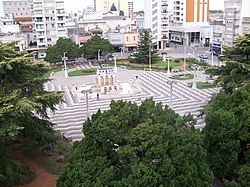Azul (Province of Buenos Aires)

|
||
| Basic data | ||
|---|---|---|
| location | 36 ° 47 ′ S , 59 ° 52 ′ W | |
| Height above d. M .: | 137 m | |
| Population (2010): | 65,174 | |
|
|
||
| administration | ||
| Province : |
|
|
| Partido : | Azul | |
| Mayor: | José Manuel Inza, FpV | |
| Others | ||
| Postal code : | B7300 | |
| Telephone code: | 02281 | |
| Website of Azul | ||
Azul is the capital of the Partido Azul in the center of the Province of Buenos Aires in Argentina . It is located 299 km southwest of Buenos Aires , and had, according to the census of INDEC in 2001 63,000 inhabitants (2010: 65,174).
history
The city was founded on December 16, 1832 after the governor Juan Manuel de Rosas ordered the construction of a fort named San Serapio Martír del Arroyo Azul as protection against the native Indians . The community developed through the allocation of land to interested parties, so that in 1895 it was formally declared a city by the provincial authorities.
On January 19, 1974, during the presidency of Juan Perón , army barracks on the outskirts of the city were attacked by the extreme left People's Revolutionary Army (ERP). This was the hitherto strongest attack on the state power in Argentina and was intended to be used for the procurement of weapons and ammunition. 3 soldiers died in the attack, one soldier was taken hostage and later executed by the attackers.
Buildings
The Roman Catholic cathedral of Azul, Nuestra Señora del Rosario, was consecrated in 1906. It is the main church of the Azul diocese , which has existed since 1934 .
The Argentine architect Francisco Salomone designed both the entrance portal to the city's main cemetery and the main building of the slaughterhouse in the Art Deco style . These buildings from the late 1930s are among the first examples of modern architecture in rural Argentina.
Education and art
The National University of Middle Buenos Aires maintains the departments for agriculture and law in Azul.
The Teatro Español from 1897 is the most important in the Pampas region. In 1992 the ballet of the Bolshoi Theater performed here .
In 2007, Azul was named a Cervantes City by UNESCO , as the Casa Ronco houses around 400 copies of Don Quixote from Cervantes. The collection was compiled by the lawyer Bartolomé Ronco (1881–1952) and includes a print from 1697.
Azul has also been the scene of the Miguel de Cervantes Festival since 2007 .
garrison
In Azul, Panzer Regiment No. 10 (Regimento de Caballeria de Tanques) and a motorized artillery division of the Argentine armed forces.
Mars crater
A Martian crater is named after Azul .
Twin town
Since mid-2011, Alcalá de Henares , the twin city of Azul.
![]()
sons and daughters of the town
- Miguel Hesayne (1922–2019), Roman Catholic Bishop of Viedma
- Rodolfo Cardoso (* 1968), football player and coach
- Silvina Moschini (* 1972), entrepreneur and business journalist
- Matías Almeyda (* 1973), football player and coach
- Juan Ángel Neira (* 1989), football player
- Federico Delbonis (* 1990), tennis player
Web links
Individual evidence
- ↑ Alcalá de Henares y Azul, "Ciudad Cervantina de Argentina" firman mañana su hermanamiento . Retrieved May 5, 2017.
